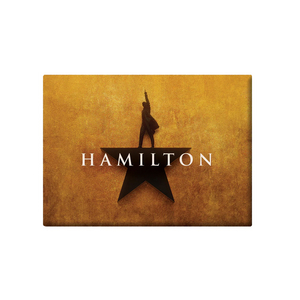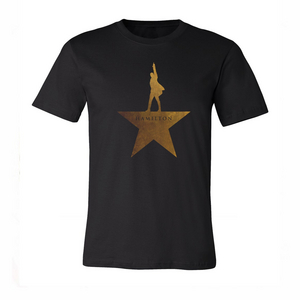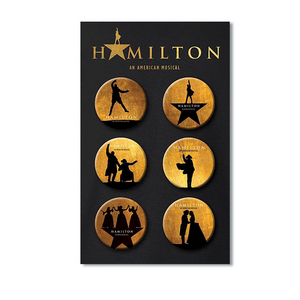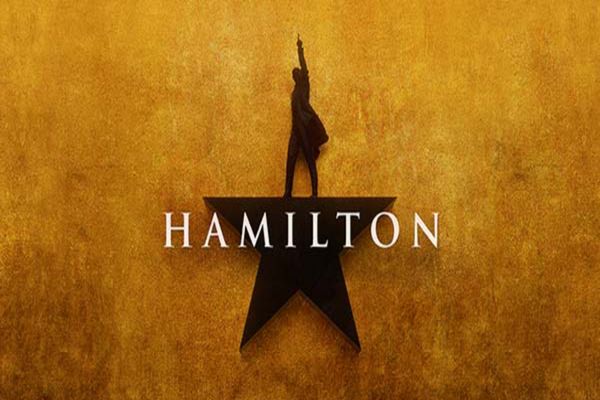Review: HAMILTON Takes a Shot at Broadway
Any concerns about the state of 21st Century Broadway musicals can be swiftly addressed by having The Public Theater transfer a show to Times Square once every season. The non-profit Off-Broadway multiplex that sent Hair and A Chorus Line uptown has, in recent years, been continually mounting some of the best musicals in town.
From the underappreciated 2010 Broadway transfer of Bloody Bloody Andrew Jackson to last season's Tony-winning Fun Home and notable non-transfers like Here Lies Love, The Fortress of Solitude and Giant in between, the number of interesting, inventive and, most importantly, well-written musical theatre offerings to come out of Astor Place in the past five years has been making most of Broadway's musical roster seem uninspired by comparison.
And now we have Lin-Manuel Miranda's Hamilton, taken from Ron Chernow's biography of "the ten dollar founding father," which has had theatre geeks salivating since a White House performance of the show's opening number, rapped by its author/composer/star, first hit YouTube and has been propelling talk of Tony Awards, the Pulitzer Prize and an unusually early Kennedy Center Honor since intermission of its first Off-Broadway preview.
Miranda didn't invent the concept of having historical characters speak and sing in contemporary pop vernacular, but his effort is so vastly superior to most because every note, every riff, every anachronistic reference drips with the sweat of its creator's belief that the young, brash hip-hop artists of today serve as modern representations of the revolutionary pulse of a group of late 18th Century rebels who won freedom for their country and then battled each other to determine the best way to run it.
As with the show that introduced him to Broadway, In The Heights, Miranda's ear-popping material kinetically fuses with the exemplary work of director Thomas Kail, choreographer Andy Blankenbuehler and orchestrator Alex Lacamoire to explosively tell the story of a man considered one of the first quintessential New Yorkers - a poor immigrant with radical ideas who pushed his way to prominence for the betterment of society.
After an opening rap where the company summarizes Alexander Hamilton's difficult childhood in St. Croix and the talent and determination that brought him to New York, the opening scene depicts his introduction to Aaron Burr, the professional colleague and rival who will eventually become the United States' 3rd vice president and infamously kill Hamilton in a duel.
Burr rises in law and politics by smiling a lot and keeping his mouth shut, but the outspoken Hamilton insists on being heard. Longing to be an officer who helps win the revolution, he's disappointed when George Washington continually keeps him out of danger because he values his skills as a writer. As the musical continues on, covering Hamilton's troubled marriage, his political battles as Secretary of the Treasury, accusations of corruption and the personal conflicts that lead to his death, the theme of the power of the written word remains constant.
It's a lot of ground to cover and Miranda does so with remarkable thoroughness. While the conventions of hip-hop allow for sound-alikes and slant rhymes, his raps predominantly hit pure ones. When the score switches to more traditional melodies, pure rhyming is always used. Though jaunty and full of clever wordplay, his lyrics are dramatically thick and rich with character. This is fine musical theatre writing disguised as freestyle.
"I am not throwing away my shot," our hero keeps repeating because, "just like my country, I'm young, scrappy and hungry." It's a lyric that serves as an anthem to the determination of youthful idealism, but as we learn of the culture of gentlemen's dueling Miranda brilliantly twists the meaning into something darker.
He's backed by a terrific ensemble of players, highlighted by Christopher Jackson as an imposing George Washington who is all-too-aware that he's being studied by history's eye, Daveed Diggs doubling as a hyper-energized Lafayette ("Immigrants: We get the job done.") and a cool and charismatic RnB Thomas Jefferson and Leslie Odom, Jr. who sings with power and is a grounded, sympathetic presence as Aaron Burr, who narrates the story with respect for his rival.
A hero in politics, Hamilton was less admirable as a husband, and revisions have considerably improved the telling of his infidelity. Phillipa Soo is very touching as his soft-spoken wife, Eliza, who elegantly deals with emotional pain and indignity and Renee Elise Goldsberry is a dynamo as his sister-in-law, Angelica, who is more of a kindred spirit.
Original Off-Broadway cast member Brian d'Arcy James was already contracted to star in Something Rotten when Hamilton opened at The Public and was replaced during extensions by Jonathan Groff in the brief cameo role of King George III. If Groff's command of the stage and sense of comedy are both lacking, his appearances work because his song, a 60s-style Brit-pop tune about losing the love of his colonial subjects, is a hilarious highlight of the score.
As an actor, Miranda keeps Hamilton a likeable man of action fighting against the ways of fellow patriots who have their own agendas and maneuver for their places in history. We watch him grow into a man who sticks to his ideals and learns how to accomplish great things without compromising them. While he plays the leading role, Hamilton is not a star vehicle and the evening is full of sensational turns by his fellow cast members.
Paul Tazewell's gorgeous 18th Century costumes are embellished with the occasional modern accessory and he cleverly dresses Blankenbuehler's contemporary hip-hop dancers in neutral beige and white, making them appear as a modern sensibility permeating through the colonial story.
The hottest ticket in town at The Public, Hamilton has only grown as a phenomenon with its move to Broadway, with its web site advising customers that good seats will start becoming available in January. And while some have pondered if Hamilton's success signals Broadway's greater acceptance of diverse contemporary music, the musical's major appeal is as old as Rodgers and Hammerstein: good writing. They loved it in the 1700s, and they're loving it now.
Click here to follow Michael Dale on Twitter.







